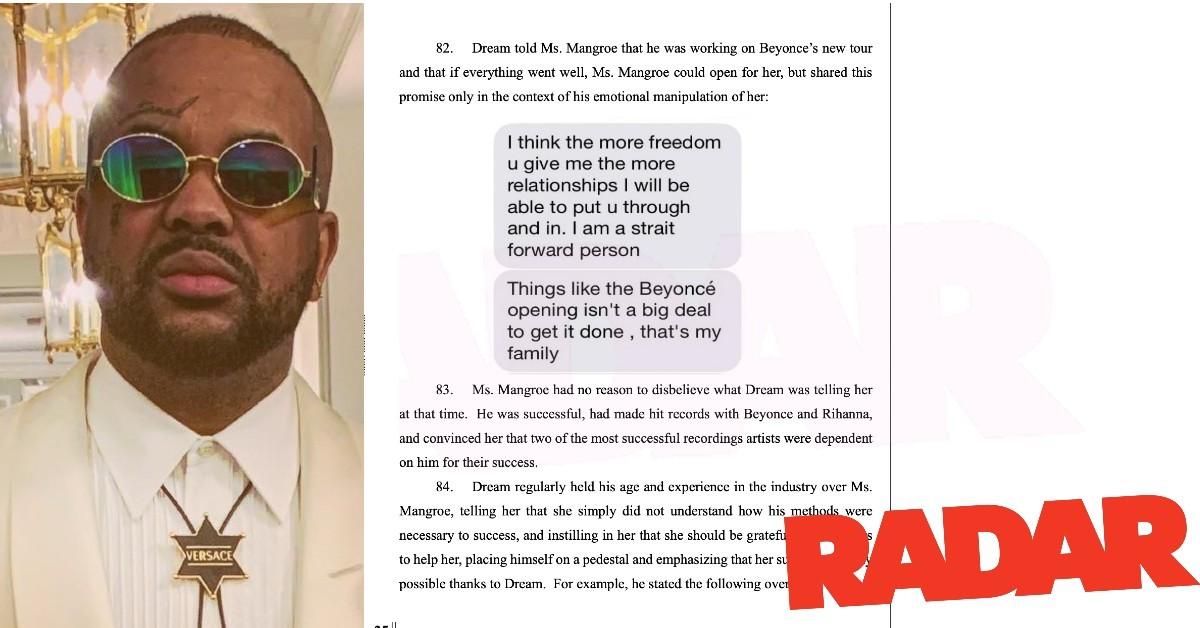Is it possible for the allure of fame and fortune to corrupt even the most seasoned individuals in the music industry? The case of Chanaaz Mangroe, also known as Channii Monroe, versus the renowned hitmaker, Dream, lays bare a complex narrative of broken promises and alleged exploitation within the high-stakes world of music.
On Tuesday, in the United States District Court for the Central District of California, a lawsuit was filed by Chanaaz Mangroe, a 33-year-old artist who performed under the stage name Channii Monroe. The complaint alleges a pattern of deception and manipulation by Terius Gesteelde-Diamant, better known in the industry as Dream, a producer celebrated for crafting hits for artists like Beyonc. The heart of the lawsuit revolves around events that transpired in 2015, a year that Monroe claims was marked by promises that ultimately went unfulfilled, leaving her professional and personal life in disarray. Court documents detail a scenario where Monroe, then a promising artist, was allegedly enticed with assurances that Dream would not only propel her career to new heights but also secure her immigration status in the United States. The implications of these claims extend beyond mere professional disappointment, touching upon issues of trust, exploitation, and the potential for predatory behavior within the entertainment industry. The suit highlights a power dynamic where a well-established figure allegedly used their influence to manipulate a younger, less established artist. This situation underscores the vulnerability inherent in the pursuit of artistic success and the devastating consequences when that pursuit is undermined by deceit. The legal battle is set to examine the specific claims, the evidence supporting them, and the impact of Dream's actions, as alleged, on Monroe's life and career. The details brought forth in this case open a window into the often-hidden workings of the music industry.
| Category | Details |
|---|---|
| Real Name | Chanaaz Mangroe |
| Stage Name | Channii Monroe |
| Age | 33 (at the time of the lawsuit filing) |
| Claimed Profession | Singer, Artist |
| Alleged Interactions with Dream | Collaborated with Dream in 2015, allegedly receiving promises of career advancement and visa extension. |
| Allegations in Lawsuit | Accusations of being lured and promises not kept, including securing her visa and writing hit songs |
| Legal Action | Filed a lawsuit in the U.S. District Court for the Central District of California on Tuesday. |
| Legal Representation | Information unavailable in provided content. |
| Key Allegations | Breach of promise, misrepresentation, and exploitation of a vulnerable individual for personal or professional gain. |
| Impact of Allegations | Undermining trust and artistic integrity |
| Mentioned in Media | The New York Times |
| Known for | Worked with Dream in 2015. |
The lawsuit, as reported by the New York Times and other media outlets, paints a picture of an aspiring artist ensnared by the promise of professional validation. Chanaaz Mangroe alleges that Dream, whose legal name is Terius Gesteelde-Diamant, lured her with the prospect of transforming her into a music sensation, similar to how he had propelled Beyonc to stardom. In her suit, Mangroe asserts that Dream made specific assurances, including promises to extend her visa and compose "blockbuster songs" tailored to her style. The legal documents presented in the case are expected to delve into the specific details of these agreements, including the nature of the promises made, the communication between the parties, and any evidence that supports Mangroe's claims. The implications of these assertions extend beyond the immediate parties involved, shedding light on the sometimes-unseen vulnerabilities within the entertainment industry, particularly for emerging artists seeking to navigate the complexities of career advancement and legal obligations.
The central allegations put forth by Chanaaz Mangroe are deeply intertwined with the power dynamics inherent in the music industry. The lawsuit suggests that Dream, leveraging his established reputation and influence, exploited the aspirations of a younger artist for his benefit. The specific claims detail how Dream allegedly made promises to extend Mangroe's visa, a crucial aspect of her ability to work and reside in the United States, and to write songs that would catapult her to fame. These assertions underscore concerns about the potential for coercion and the abuse of power within creative partnerships, where the imbalance of influence can lead to exploitation.
The filing of the lawsuit in the U.S. District Court for the Central District of California marks the commencement of a legal battle that will likely unfold over an extended period, potentially involving a wide range of evidence and testimony. The court proceedings may focus on examining the nature of the relationship between Mangroe and Dream, the specific agreements made between them, and the evidence supporting each partys claims. The outcome of the case has the potential to influence industry practices and legal precedents, particularly concerning the responsibility of established artists and producers towards emerging talents. Furthermore, the legal action will likely scrutinize the power dynamics inherent in the music industry, highlighting the potential for exploitation when promising talents are vulnerable to those with established reputations and control over their careers.
The lawsuit filed by Chanaaz Mangroe against Dream has captured the attention of the music world and beyond, raising critical questions about the ethical responsibilities of industry professionals. The core issue lies in the allegations of broken promises and the potential manipulation of an aspiring artist. This case underscores the importance of safeguarding the rights and interests of artists, particularly those in the early stages of their careers. The legal proceedings that follow will likely provide valuable insight into the dynamics of power, trust, and accountability within the music industry.
The heart of Mangroe's lawsuit lies in the alleged breach of trust and misrepresentation by Dream. Court documents are expected to detail the promises made to Mangroe, including the assurance of extending her visa and the prospect of writing songs that would replicate the success Dream had achieved with Beyonc.
In summary, Chanaaz Mangroe's lawsuit against Dream is more than just a legal dispute; it's a commentary on the realities of the music industry. The case promises to expose the details behind the allegations, the impact of Dream's actions on Mangroe's career, and the crucial significance of protecting the rights of artists.


